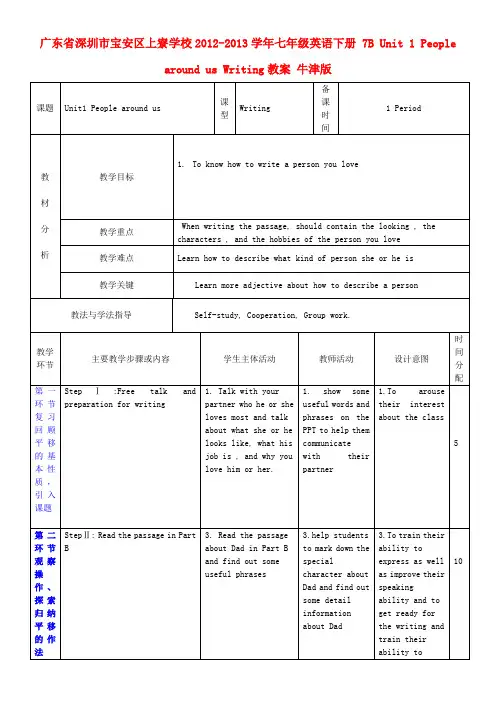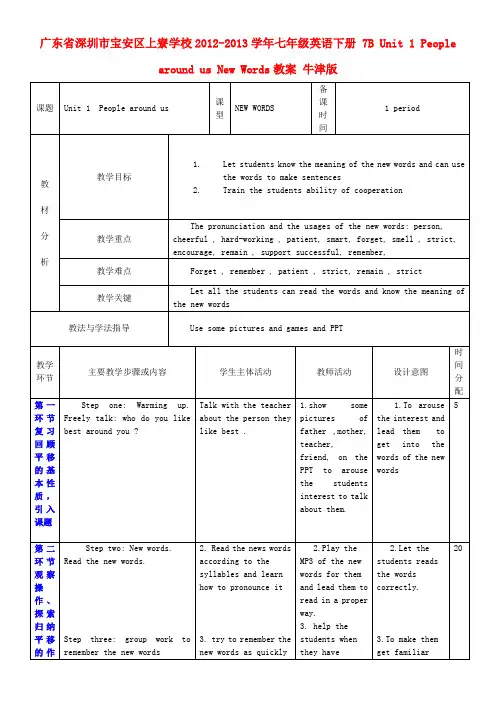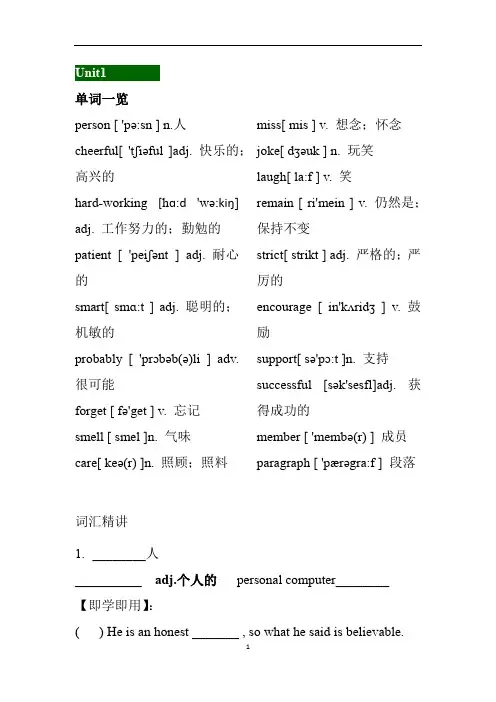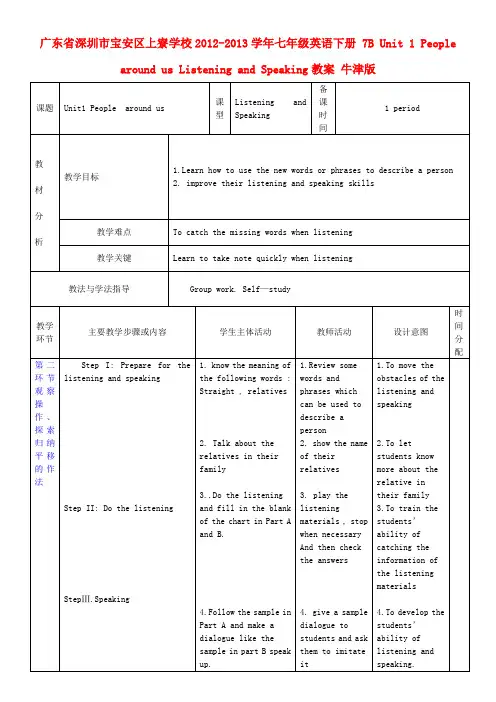(完整word)7Bunit1最新广州、深圳沪教版牛津英语七年级下册教案
广东省七级英语下册 7B Unit 1 People around us Writing教案 牛津版

When writing the passage, should contain the looking , the characters , and the hobbies of the person you love
教学难点
Learn how to describe what kind of person she or he is
1.show some useful words and phrases on the PPT to help them communicate with their partner
1.To arouse their interest about the class
5
第二环节 观察操作、探索归纳平移的作法
How to organize the writing.
5. to sum up the points we usually have to contain in introducing a person you love
5.List the beautiful sentences they write in the passages
5.Let them get familiar with the writing.
5
第五环节 课后作业
1. Recite the passage which given as a sample .
课
堂
教
学
流
程
Free talk and preparation→Read a sample passage→write a passage—Check the writhing.
4.remind students to pay attention to their handwriting
广东省七级英语下册 7B Unit 1 People around us New Words教案 牛津版

Forget , remember , patient , strict, remain , strict
教学关键
Let all the students can read the words and know the meaning of the new words
教法与学法指导
Use some pictures and games and PPT
广东省深圳市宝安区上寮学校2012-2013学年七年级英语下册7B Unit 1 People around us New Words教案牛津版
课题
UniNEW WORDS
备课时间
1 period
教
材
分
析
教学目标
1.Let students know the meaning of the new words and can use the words to make sentences
教学环节
主要教学步骤或内容
学生主体活动
教师活动
设计意图
时间
分配
第一环节 复习回顾平移的基本性质,引入课题
Step one: Warming up. Freely talk: who do you like best around you ?
Talk with the teacher about the person they like best .
2. Read the news words according to the syllables and learn how to pronounce it
3. try to remember the new words as quickly as you can, with the help of the group leader, then check with each other whether you remember the words or not .
上海版牛津英语七年级第二学期7B-Unit1

单词解析
词组解析
语法夯实
4. grand [ græ nd ] adj. (用于大建筑物等的
For example
1) 壮丽的;富丽堂皇的;重大的 : It's not a very grand house. 这房子并非富丽堂皇。 2) 宏大的;宏伟的;有气派: The people in Tokyo built their city on a grand scale. 东京人大力兴建自己的城市。
If sb does sth, sb may(情态动词) do sth
单词解析
词组辨析
语法夯实
考点过关
1. If she _re_tu_r_n_s _(return) from Paris, please _w_i_ll_ca_ll__ 2. If he _pa_s_se_s__ (pass) the test ,we may_w_i_ll_b_uy__ ( 3.Get up early, not be late
单词解析
词组辨析
条件状语从句
语法夯实
由if引导的从句叫条件状语从句,if意为“如果 (1)主句是一般将来时,从句要用一般现在时。
If sb does sth, sb will do sth = sb will do sth if sb does sth
(2)主句为祈使句或情态动词形式
If sb does sth, please do sth
For example
oriental coutries/languages/customs 东 方国家/语言/风俗 oriental civilization/art 东方文明 /艺术 【联想】Orient [ ˈɔ:rient ]n.东方
深圳沪教牛津版七年级下册英语Unit 1 教学教案

Unit1单词一览person [ 'pə:sn ] n.人cheerful[ 'tʃiəful ]adj. 快乐的;高兴的hard-working[hɑ:d 'wə:kiŋ] adj. 工作努力的;勤勉的patient [ 'peiʃənt ] adj. 耐心的smart[ smɑ:t ] adj. 聪明的;机敏的probably [ 'prɔbəb(ə)li ] adv. 很可能forget [ fə'get ] v. 忘记smell [ smel ]n. 气味care[ keə(r) ]n. 照顾;照料miss[ mis ] v. 想念;怀念joke[ dʒəuk ] n. 玩笑laugh[ la:f ] v. 笑remain [ ri'mein ] v. 仍然是;保持不变strict[ strikt ] adj. 严格的;严厉的encourage [ in'kʌridʒ ] v. 鼓励support[ sə'pɔ:t ]n. 支持successful [sək'sesfl]adj. 获得成功的member [ 'membə(r) ] 成员paragraph [ 'pærəgra:f ] 段落词汇精讲1.________人__________ adj.个人的personal computer________ 【即学即用】:( ) He is an honest _______ , so what he said is believable.A. childrenB. smellC. jokeD. person2.快乐的高兴的(adj) _____________ = ______________ 【同根词】_______ n & v高兴;使振奋【固定搭配】:cheer up________ *cheerleader___________Cheerleaders’ task(任务) is to cheer up players._________________________________________________ _____●Yellow is a _________________ (cheer) color.●She is a happy girl. She is always __________________(cheerful / sad).【即学即用】:()1. --- He has many friends, so he always looks cheerful.--- Yes, he really is.A. sadB. worriedC. happy()2. Tom is a _______ student. So he does well in his lessons.A. cheerfulB. tallC. hard-workingD. lazy3. (1) __________ adj. 耐心的_______ n. 耐心【固定搭配】:be patient with sb _______________________(2) ________ n.病人The doctor is patient with his patients.Mr Oliver is very_____________ (patience).5. _____ adj.聪明的= ___________比较级: ______________ 最高级______________●At present, everyone is playing smart phone on thesubway.●He likes to ask himself “Am I smarter? ”6.___________ adv.很可能= ___________【同根词】:adj. _________You’re ____________ (probable) right.—“Will it be a sunny day tomorrow?”—“Probably not.”7.________ v.忘记(过去式)________(过去分词)___________【反义词】:___________forget的短语:forget to-v / forget v-ing(1) forget to do sth.表示“______________”(未做)Don’t forget to turn off (关闭)the light when you leave.(2) forget doing sth表示“_______________”(已做)He forgot watering (浇花) the flowers.思考:remember to v 与remember v-ing●remember to do sth.表示________________________________________●remember doing sth.表示_________________________________________【即学即用】:●( )Don’t forget an umbrella you.It’s going to rain.A. to take; toB. taking; toC. to take; withD. take; with●I forgot _______ (close) the door, so I went back to have alook.●Remember ______ home to see your grandparents usually.8.____________ n.气味;v.闻;闻起来①作名词,意为“气味”。
牛津英语七年级下册Unit1教案

牛津英语七年级下册Unit1教案牛津7BUnit1第四课时教案教学内容(Teachingcontent):牛津初中英语7B第一单元词汇部分第四课时教学目的和要求:复习阅读部分内容及其知识点和句型表达;要求学生对词汇部分有全面的掌握本课类型:教授+操练教学方法:启发式教具准备:图片教学重点、难点和关键:用英文识别家具名称并能灵活使用为重点家具在一个家中的角色.通过学习这部分,如何使学生更深地理解家的概念是关键.教学过程:复习:Askingthestudentstotellwhosehomeheorshelikesbest andwhy.Byansweringthisquestion,wecangetthestudentst oreviewtheReadingpartwhilethinkingaboutwhathisorher idealhomeis.Itispossibletogetananswerlikethis:Ilikemadee’shomebestbecauseitisfuntoliveinahouseoverariverandc limbaladderintothehouseeveryday.Askingfiveorsixstudentstotellabouttheirideas.引入:Q:Homeisimportanttoeveryoneintheworld.whatdoyout hinkhomeis?Imightgetananswerlikethis:Ican’tfeelafraidorhungryathome.Lettingthestudentstalkaboutthequestionandhaveashort discussion.Q:whatmakesupofahome?Lettingthestudentsdiscussandthenpickingsomestudents totellabouttheirideas.Next,byshowingthemapictureoff amilymembers,apictureofahouseandapictureofdifferentroomsandfurniture,Icanmakethestudentsunderstandthat people,housesandfurnituremakeupofahome.Andtheyareal limportant.PEoPLE+HoUSE+FURNITURE=HomE授课内容及练习:ofcourse,withoutfamilymembers,there’snohome.Besidesfamilymembers,housesarethesecondmost important.Inahouse,weusuallyhavedifferentrooms.Basi cally,whatroomsdoneedinahouseforahome?sittingroomdiningroombathroombedroomkitchenstudybalconywealsoneeddifferentfurnitureindifferentrooms.Showin gthestudentssomepicturesoffurniture.whichroomdothey belongto?…Askingthestudentstonameoutthefurnituresaccordingtot heroompicturesshown.Sittingroom:sofacoffeetablearmchairlampTVDiningroom:diningtable.chair.napkinpaper.dinnerset.Bathroom:toilet.basin.shower.mirror.towel.Bedroom:bedbedsidetablelampdressingtablekitchen:cupboardcookermicrowaveovenfridgeStudy:bookshelflampcomputerNext,lookingatPartB.Simonismakingatableshowingtheob jectsindifferentroomsinNeil’shouse,buttherearesomemistakes.Helphimfindthemistak esandcirclethem.Askingthestudentstotakeouttheirfamilypicturesandtal kaboutyourhomewiththeirdeskmate…Askingsomestudentstocometothefrontandtalkabouthisor herhome…Discussion:Supposeyouhaveanemptyhouse.Butyouhaveonlytenthousan dyuan,whatfurniturewouldyouliketobuyfirst?Andwhy?小结:Askingthestudentstowriteasmanynamesoffurnitureasthe ycanwhileonestudentwritesontheblackboard.Atleastfiv eforeachroom.Thencheckingthewritingontheblackboardw iththestudents.作业布置:Pleasewritesomethingaboutthefurnitureyouneedorchang einyourhouserightnowandwhy.Atleast80words板书设计:PEoPLE+HoUSE+FURNITURE=HomEbedsidetable,lamp,coffeetable,sofa,cupboard,armchair↑↑↑↑↑↑bedroomsittingroomsittingroomkitchensittingroombedroombedroom教学后记:本课容量大,并有很大扩展,听、说、读、写都兼顾到;师生互动性强;在授课期间,要节奏快,引导和启发到位,确保学生的知识和能力都有收获.7BUnit1第2课时教案Reading1常州市第二十四中学英语组岳茵教学内容:7BUnit1第2课时Reading1教学目的及要求:1了解不同国家居住环境的情况。
广东省七级英语下册 7B Unit 1 People around us Listening and Speaking教案 牛津版

第三环节 课堂练习
Step IV :Make notes about the listening.
4.Write down the key words you get in the listening part.
e ppt to help them sum up
6.Help them to cultivate the ability of summarizing.
第五环节 课后作业
Make a dialogue in written way to talk about a relative in your family
课
堂
教
学
流
程
Prepare for listening→Listening→Speaking→summary
效
果
评
价
与
反
思
4.Tell them to find the key words.
4.To help the students develop some ways of listening.
第四环节 课时小结
StepⅥSum up
6.Know how to take notes when doing the listening and know how to talk about a relative in your family
1.To move the obstacles of the listening and speaking
2.To let students know more about the relative in their family
(完整word版)7Bunit2最新广州、深圳沪教版牛津英语七年级下册教案.doc
7B Unit 2Travelling around the world重点单词:France n.法国French adj.法国的Frenchman 法国人(复数:Frenchman)Flag 国旗,标志Tick滴答声Store 商店,贮存East 东coast n.海岸Tower 塔Town 镇greeting n. 敬礼,致意,问候possible 可能excellent adj. 卓越的,杰出的south南perfect 完美的finish完成receive 收到wine 酒Europe 欧洲lie 位于,撒谎west 西north 北ski 滑雪lift电梯,举起step n.脚步stairs楼梯date 日期address 地址重点词组Be famous for以···而闻名be famous as 作为什么而出名Be different from与···不同Far away from 远离Go on holiday去度假(China is famous for The Great Wall 。
)( Jielun Zhou is famous as a singer)反义词组: be the same asdepartment store百货公司prefer togo sightseeing去观光和···一样更加喜欢,宁愿详细讲解:1.I can jump higher than the Eiffel Tower!我能跳得比埃菲尔铁塔高!(page15)higher than 副词比较级。
句型为:“A+ ··· +副词比较级 +thanB ”如: You study harder than me.你比我学习更努力。
2.Don ’tbe silly , Lo 。
别傻了, LO. ( page15)这是一个祈使句,用来表示请求、命令、叮嘱、劝告等语气,主语(you)通常可以省略。
word完整版牛津沪教版英语七年级下Unit1复习教案
牛津沪教版英语七年级下Unit1 复习教案U1 Writing a travel guide教学过程:1.词汇梳2.重要句型及语3.课堂练4.家庭作Part 词汇梳理1. guid nv.(1) guid作名词时,可以表示①导游The guide took us around the Palace Museum.导游带我们参观了故宫②导游手相当guidebookDo you need a guide?It tells you a lot about the Forbidden City.你需要一本导游手吗?它会告诉你很多关于紫禁城的信息③指南A Guide to English Grammar《英语语法指南(2) guid作动词时,可以表…领路,带的意思。
如Martin guided him to the reception room.马丁把他领到接待室批注:让学生注意分guid的两种词2. tour n旅行;旅Can you give us some tour suggestions?你能给我们一些旅行建议吗【联想touristn.游客,旅游3. reason n.原因,理The reason why she was late was that she forgot to set the clock.她迟到的原因是因为忘记了定闹钟【近义词causen.原因,起因,缘故;理【拓展reasonableadj.合理的,明智批注the reason wh的句可以让学生用在写作中3. take part in参加(活动如We'll take part in the sports meeting this Friday.本周五我们要参加运动会They have decided to take part in a competition.他们决定参加一个竞赛【比较take part ijoin都参的意思take part in表示参加某项活动joi示参加或加入某个团体或组织如He joined the Party ten years ago他十年前入党I'll join the Youth League next month.下个月我要入团【提示take part in = join in批注:注take part injoi的区4. sightseeingn观光;游Tourists usually go there for sightseeing and fun游客们通常会去那儿观光游玩【记忆go sightseein去观【联想go shoppin去购物go swimmin去游泳go fishin去钓鱼go travellin去旅游11/ 1复习教案牛津沪教版英语七年级下Unit1去徒步旅行go boating去划船;go hiking go camping去野营;go cycling去骑车;去打猎go windsurfing去风帆冲浪;go hunting go skating去溜冰;观光旅游 a sightseeing tour【拓展】a sightseeing bus观光旅游车的中部位于……5. in the centre ofin the middle of 强调与四周距离相等的中心位置,常用来指空间;【比较】in the centre of强调两端之间的位置,并不强调中心,既可用于指空间,也可用于指时间。
广东省七级英语下册 7B Unit 1 People around us Reading教案 牛津版
5
第四环节 课时小结
step Six: Sum up
6 Sum up :when you talk about a person , what will you talk about?
6.Show a PPT to sum up : when you talk about a person , you should talk about :
Describe a person
1.tell me what your best friend looks like and what she or he likes doing
1. Show the questions : what does he or she look like?
2. what is his or her hobbies
4.train the students speaking ability and cooperation ability.
25
第三环节 课堂练习
Step five: exercise
5.Finish the exercise in Part C and D
5.Help them to find the details in the text.
广东省深圳市宝安区上寮学校2012-2013学年七年级英语下册7B Unit 1 People around us Reading教案牛津版
课题
Unit1 People around us
课型
Reading
备课时间
1 period
教
材
分
析
牛津英语 七年级下册7B Unit 1 教案
Unit 1 Dream homesComic strip and welcome to the unitTeaching Aims:1. Learn some names of places of interest, cities and countries in the world.2. Arouse the students’ interests in the differences between countries.Step 1. Lead-inShow some well-known places of interest in China for the Ss to enjoy and let Ss know the phrase: place of interest:the Elephant Trunk Hill in Guilin the Palace MuseumStep 2. Presentation1. Show some pictures to learn some words about different places and teach some countries and their capitals.Countries and Capitals:Japan Canada Russia the USA the UK France Tokyo Ottawa Moscow Washington DC London Paris2. Then read aloud the new words.palace town Canada France Japan RussiaUK (United Kingdom) next toStep 3. PractisePractise in pairs like this to talk about some places of interest to arouse the Ss’ interest in the topic in this unit.A: Do you like travelling(旅游)?B: Yes, I do.A: What places of interest do you know?B: ....Step 4. PresentationPresent some pictures for Ss to learn some places of interest and the names of the countries and capitals. Then ask Ss to complete Part A on Page 7.Step 5. PractiseTalk about each picture, using Part B as a model.Step 6. Learn the conversation1. Discuss in groups before watching the video:Where do you think Eddie would like to live?Why?2. Answer the questions:1) Where would Eddie like to live?2) Why would Eddie like to live next to a restaurant?3) Which is Eddie’s favorite restaurant?3. Act out the conversation.4. Fill in the blanks:Eddie doesn’t want to live in a ________. However, he would like _______ next to a __________. He _______ the biggest ________ in Fifth Street best.Step 7. Explanation1. live next to a restaurant 住在饭店隔壁2. big 大的----- bigger 更大的-----biggest 最大的3. learn about sth. 了解某事4. in different counties 在不同的国家5 What’s the capital of Canada?Homework:1. Remember the new words and language points in this lesson.2. Preview the new words in Reading.Reading ITeaching Aims:1. Learn some new words about talking about homes in different countries.2. Practise reading skills by learning three blogs.Step 1. PresentationPresent the new words with pictures and read them aloud:mile garden flat centre = center living room share …Step 2. Lead-in1. Ask Ss the questions: What is your home like?2. Let them talk about it with the help of the following expressions:I have a (big/small) house/ flat.It has a (gard en/balcony/ bedroom/ bathroom/ living room…)I like … because I can … there.Step 3. Reading1. Listen to Neil’s blog and answer the questions:1) Where does he live?2) Which is his favorite place, the garden or the kitchen?2. Read the second blog and complete the form.3. Read the third blog and fill in the blanks.Stephen has a ________ house in Los Angeles. It has ______rooms. His favourite place is the _________. He can see the _______ and the _________ from there.4. Read aloud the blogs.5. Complete B1, B2 and B3.Step 4. TaskGet into groups of four. One of Ss plays the interviewer. The other three play Neil, Anna and Stephen. Ask each of them at least four questions about their homes. Homework1. Read aloud the blogs and underline the difficult parts, then discuss them with your classmates.2. Remember the new words in this lesson.Reading IIAims:1. Learn the language points in this article.2. Learn to talk about Ss’ own homes.Step 1. Revision1. Fill the blanks according to the blogs we learned.Neil is from __________. He lives in a ______ house in a town fifteen _______ from London. His favorite place is the _________. They have a beautiful garden. Healways ______ ______ with his pet dog in it.Anna lives in a _____ in the _______ of Moscow. It’s a little _______, but they have a nice ________. She ________ a bedroom with her sister. They often _____ ______ music in bed.Stephen has a ______ house in Los Angeles. He has his ______ bedroom and __________. The _________ is his favorite place. He can look out at the _______ and the ________.2. Read aloud the blogs then complete B4 on Page 10.Step 2. Language points1. have fun = have a good time 玩得愉快We often have a lot of fun in the park at the weekend.★have fun doing sth. 做某事很愉快They had fun playing football yesterday.2. in the centre of Moscow 在莫斯科市中心3. share sth. with sb. 和某人分享(合用)某物Let’s share the cake.4. look out at the beach and the sea向外看海滩和大海Step 3. InterviewYou are an interviewer. You want to interview one of your classmates. Ask him/ her at least four questions about his / her homes.Step 4. ExercisesHomework1. Recite the three blogs.2. Remember the language points in this lesson.GrammarTeaching aims:Learn the spellings and usages of the cardinal and ordinal numbersStep 1. Lead-in1.Enjoy a number song.2.Talking about numbers freely.Remind Ss to ask such questions:How old are you?How many family members are there in your family?How many students are there in your class?What’s your favourite number?What is your telephone number?…Step 2. Present new wordszero hundred thousand million foot (pl. feet )square metre area overStep 3. Cardinal numbers1. Teach the spelling and usages of cardinal numbers: zero, one … million.2. Teach Ss how to read the cardinal numbers:4,056 four thousand and fifty-six23,813 twenty-three thousand eight hundred and thirteen567,110 five hundred and sixty-seven thousand one hundred and ten6,425,200 six million four hundred and twenty-five thousand two hundred3. Help them to find out the rules of reading a big number.4. Read and learn1) People from about 180 countries and areas live in New York.2) The CN Tower is 1,815 feet tall.3) Red Square in Moscow is about 91,000 square metres in size.4) France has an area of over 260,000 square miles.5) There are about 8,000,000 people living in London6) Tokyo, the capital of Japan, has over 13,000,000 people.Step 4. Ordinal numbers1. Explain the usage of ordinal numbers.We use ordinal numbers to order things and events. We use them to talk about dates, floors, positions, etc .e.g. Women’s Day is on the eighth of March.Our flat is on the seventh floor.He is always the first to come to school in our class.2. Learn the spellings of the ordinal numbers with the help of the cardinalnumbers. Remind the Ss the rules of the word-building.基变序,很容易;1,2,3 特殊记;8去t, 9去e;ve 要用f 替;ty 变成tie.3. Complete B 2 on Page 12.Step 5. Summary一、基数词用法1. 基数词在表示数量时与表示编号、号码时的读法不一样。
- 1、下载文档前请自行甄别文档内容的完整性,平台不提供额外的编辑、内容补充、找答案等附加服务。
- 2、"仅部分预览"的文档,不可在线预览部分如存在完整性等问题,可反馈申请退款(可完整预览的文档不适用该条件!)。
- 3、如文档侵犯您的权益,请联系客服反馈,我们会尽快为您处理(人工客服工作时间:9:00-18:30)。
7B Unit 1 People around us
重点单词:
person n.人cheerful adj.快乐的,高兴的hard-working adj.勤勉的,努力的smart adj. 聪明的forget v. 忘记patient ①adj.耐心的②n.病人probably adv.可能care 照顾smell n. 气味v.闻起来
miss v.想念,错过joke 玩笑laugh 笑
Remain 保持strict 严格encourage v.鼓励
support 支持successful adj.获得成功的success n.成功
member 成员paragraph n.段落Dress n.连衣裙v.给···穿衣服Die v.死(非延续性)单数:dies 过去式:died 现在分词:dying adj.dead n.death
常考短语:
as well as 也,和··一样take care of =look after照顾
tell jokes 讲笑话make fun of 取笑
all day and all night 整日整夜go to work 去工作
give up 放弃give up 放弃
be strict about 对···严格be strict with sb.对某人要求严格
be strict in sth 对某事严格
经典句型:
1.she was really ····?
2. She is good at ···?
3. What do you think of ··?你任务/觉得··怎么样?(询问对方对某人/事的看法,态度)
4. Why not do sth.···?(page12)为什么不做某事?(提出自己的建议或者征求意见)
5.询问工作的句型:what +do/does +主语+do?;What is/are +主语;What +is +sb’s job?
详细讲解:
1.Talk about the people you like .谈论你喜欢的人。
(page1)
Talk about 谈论
Talk with 与···交谈(强调双方无主次性,相互交流)如:she is talking with a friend.
Talk to 跟···谈话(强调一方的主动性,另一方以听为主)
如:I want to talk to my mother about the computer.
Can是情态动词,“能,能够”还可以表示“许可,请求”的意思,后面加动词原形。
肯定句变否定句时,can 后加not ,简写:can’t 不能,不会
肯定句变疑问句时,将can 提到主语之前。
如:can you draw?——yes,I can./no I can’t
can(could),may (might), must ,need ,ought to ,
dare (dared), shall (should) ,will (would)。
4.My grandmother was a short woman with grey hair.(page3)
With :①具有,带有。
②用,以··· she is writing with a pencil.
③和···一起 come with me.
④携带 I have no money with me .
⑤关于,对于 what’s wrong with you?
6.she was a very good cook.她是一个很好的厨师。
(page3)
Cook 可数n. 厨师 V.煮,烧 cook+er=cooker 炊具
7.I will never forget the taste,and the smell as well.(page2)
还有类似:(page4)
例句:he can swim as well. He also wants to go there.
I’m a boy,too. He doesn’t want to go there,either.
8.she never makes fun of others.她从来不取笑别人。
(page3)
①Make sb. do sth. 让某人做某事。
Make是使役动词,后加省“to”的动词不定式做宾补。
如:My mother made me do homework. 注意:使役动词是表示使、令、让、帮、叫等意义的不完全及物动词,主要有leave.get.keep.make(使,令), let(让), help(帮助), have(有;让;从事;允许;拿)等。
②make fun of 取笑
9.I hope we will always remain friends。
我希望我们永远是朋友。
(page3)
(1)①hope+that宾语从句(此处that省略)I hope they win the match.
②hope to do sth 希望做某事 I hope to be your good friend.
③ Hope for 盼望,期望 we hope for the best
(2)remain连系动词,“仍然是,保持不变”+n./adj./v-ing 如:we remain silent.
类似的还有:keep(保持),stay(保持),continue(继续、仍旧),stand(处于某状况) 10.His classes are always full of fun.他的课总是充满乐趣。
(page3)
Be full of 充满(形容词)反义词:empty(空的)
Be filled with 装满(动词)反义词:empty (倒空)
(往瓶子里一直“fill”,直到“full”)
11.It was about saving the Earth from aliens.是关于抵御外星人、拯救地球的。
(page7)
①Save 及物v. 挽救,拯救 save ···from ··挽救···免于···
Save one’s life 救某人的命 The doctor saved tne boy’s life.
②表示节省、节约 we’ll save 20 yuan。
③表示储存、贮存 I am saving some money for travelling.
Grammar:定冠词the的用法
1.特指某(些)人或某(些)物,这是定冠词的基本用法。
Beijing is the capital of China. 北京是中国的首都。
2.指谈话双方都知道的人或事物。
Open the window please. 请把窗户打开。
(双方都知道指的是哪一扇窗户) 3.指上文已经提到的人或事物。
There is a pen on the desk. The pen is red.
4.指世界上独一无二的事物。
Which is the biggest, the sun, the earth or the moon?
5.用在序数词、形容词最高级前。
The first truck is carrying a few baskets. 第一辆卡车装运一些筐。
6.用在由普通名词构成的专有名词前。
the Great wall长城,the Summer Palace颐和园,
7.用在某些形容词前,表示某一类人。
the rich富人 the poor穷人 the sick病人 the old老人,
8.用在姓氏复数形式前,表示“全家人”或“夫妇俩”。
The Turners are going home on a train. 特纳夫妇在回家的火车上。
9.用在方位词前。
on the left/right在左/右边
in the east/west/north/south在东/西/北/南方
at the back/front of在……的后/前面
10.用在乐器名称前。
(加运动不用the,加乐器要用the)
Do you like playing the piano or the violin?
11.用在表示海洋、河流、山脉、群岛及国家和党派名词前。
the East China Sea 东海
12.用在某些固定词组中。
all the same 仍然 all the time 一直
in the morning/afternoon / evening 在上午/下午/晚上。
